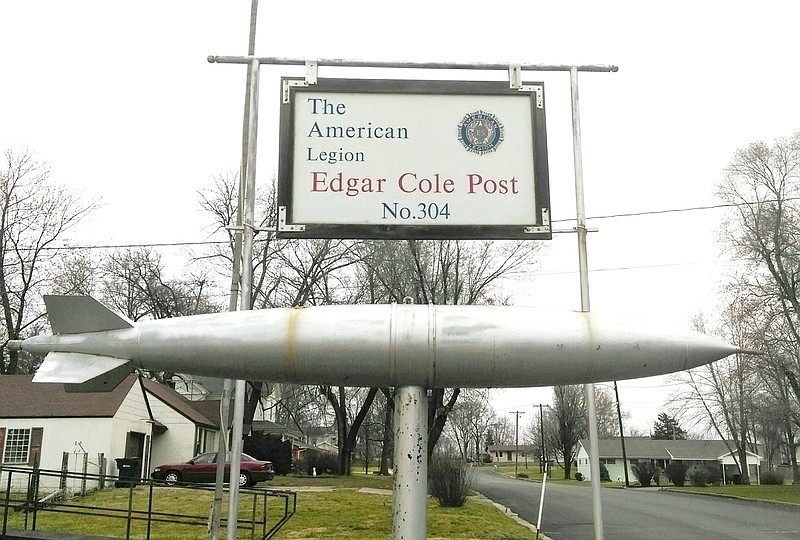Described as a red-haired, short and slender 28-year-old on his draft registration card, Tipton native Edgar Cole's adult life blossomed with a career as a locomotive engineer for the railroad followed by his marriage to a local woman. The trajectory of his future soon shifted, however, when he was drafted into the Army in WWI, eventually losing his life and becoming yet another loss among several that his mother would experience in her lifetime.
Born in Tipton on Jan. 31, 1889, Edgar Cole's mother, the former Lula Hickman, chose to live with her parents after she was widowed at a young age, as evidenced by information retrieved through the 1900 U.S. Census
Growing up as an only child in the home of his grandparents, newspaper reports indicate Cole was employed in the eastern division of the Missouri Pacific Railroad as early as 1909, and was described as "the best-liked fireman on the 'Old Reliable,'" in the Jan. 26, 1910, edition of the Sedalia Democrat.
Though he grew up in Tipton and later lived in Sedalia, the June 4, 1917, edition of the Jefferson City Post-Tribune wrote that Cole went on to reside many years in the state's capital city and was married in Sedalia "to the girl of his choice," Miss Grace Chamberlain, of Tipton, on June 3, 1917.
Having risen through the ranks at the railroad to become a locomotive engineer, Cole's life seemed to be progressing well until the Selective Service Act of 1917 required all men "aged 21 thru 30 register at (local) voting precincts," as explained in the book "Uncle, We Are Ready!: Registering America's Men 1917-1918."
The 28-year-old Cole registered with his local voting precinct in Tipton on June 5, 1917 - two days following his marriage and the date set forth by the Selective Service Act as the first of three primary registration dates.
Cole's fate was sealed on June 27, 1918, when his registration number was drawn during a national lottery that occurred in Washington, D.C. Several weeks later, on Aug. 8, 1918, Cole was inducted as a private in the Army at nearby California, Missouri.
According to his service card, Cole arrived at Camp McArthur, Texas, on Aug. 16, 1918, and underwent an accelerated basic military training with Company I, 12th Battalion, Infantry Replacement and Training Camp.
Amanda Sawyer, in an article she wrote for a section of Baylor University's website on the history of Waco, Texas, noted the construction of Camp MacArthur began on July 20, 1917; and was "spread out on 10,700 acres of cotton fields and blackland farms (and) possessed the capacity to hold around forty-five thousand troops."
Sawyer goes on to explain the camp had been used to train the soldiers of the 32nd Infantry Division and, following the division's deployment to France in February 1918, the camp transitioned into an infantry replacement and training site for recruits from Texas, Arkansas, Missouri and New Mexico.
Cole's hurried training at Camp MacArthur ended in early September 1918 when he boarded a troop ship bound for France, arriving overseas on Sept. 23, according to the dates entered on his military service card.
Little evidence exists that would denote whether Cole ever experienced any combat following his arrival in France; however, records indicate he passed away in a hospital on Nov. 13, 1918 (two days after the armistice) from what was listed as lobar pneumonia.
An article by the Centers for Disease Control and Prevention notes that of the deaths from bacterial pneumonia during the 1918-19 influenza epidemic (also known as the "Spanish Flu"), the "median time from illness to onset of death was 7-10 days, and significant numbers of deaths occurred >2 weeks after initial symptoms." As such, it is unlikely Cole saw combat during the few weeks he was in France since he would have soon fell ill after processing into his new unit.
The soldier's family soon learned of his demise and his body was shipped back to the United States, where it was interred in the Masonic Cemetery in Tipton. Cole's wife later moved to St. Louis then to Los Angeles, and remarried in 1924. She passed away in 1940 and her remains were returned to Tipton and interred in the Masonic Cemetery.
Lula Cole, the late soldier's mother, found little peace in the years following the deaths of her husband and son - she would lose her mother in 1922, her father in 1929 and a younger brother in 1931. Lula Cole lived to be 75 years of age and was buried in a grave next to her son in 1943.
According to the 1980 edition of the book "Moniteau County, Missouri History," the "Edgar Cole Post 304 of the American Legion was first organized around 1921." The book further explains the building currently used by the post was built on a lot purchased in 1949.
A century has passed since the "Great War," but the community of Tipton continues to grieve the loss of one of their own by gathering at the grave of Cole every Memorial Day to pay their respects. Local citizens like Cole left home and were thrust into hostile foreign lands, often clinging to the hope that their sacrifices would never become a long-forgotten memory.
"They shall not grow old, as we that are left grow old: age shall not weary them, nor the years condemn," wrote poet Laurence Binyon in his "Ode of Remembrance."
"At the going down of the sun and in the morning, we shall remember them." He added, "They mingle not with their laughing comrades again; They sit no more at familiar tables of home "
Jeremy P. Amick writes on behalf of the Silver Star Families of America.

